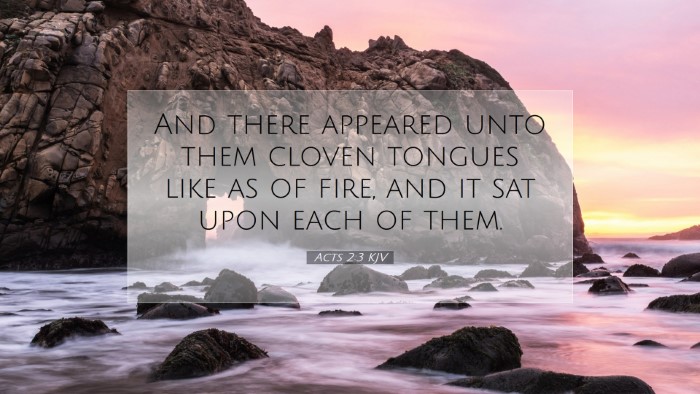Acts 2:3 Commentary
In this brief yet profound verse, we encounter a momentous event in the early church: the outpouring of the Holy Spirit at Pentecost. Acts 2:3 states, "And there appeared unto them cloven tongues like as of fire, and it sat upon each of them." This moment is pivotal, not only for the disciples but for the entire trajectory of the Christian faith. The significance of this event has been explored by numerous commentators, and below we distill their insights.
1. The Context of Pentecost
Matthew Henry highlights that the scene takes place during the Feast of Pentecost, a time when Jewish people gathered to celebrate the wheat harvest and the giving of the Law at Sinai. This context carries deep theological significance as the gift of the Spirit parallels the giving of the Law, signifying a new covenant established in Christ. Albert Barnes observes that these events occur fifty days after the Passover, a period during which the disciples were waiting and praying as instructed by Jesus.
2. Cloven Tongues
When we examine the phrase “cloven tongues,” various interpretations arise. Adam Clarke explains that the term suggests a division or a repartition of tongues, symbolizing the diverse languages that would soon be spoken as the gospel spread to all nations. This indicates the universal nature of the Gospel that transcends cultural and linguistic barriers, underscoring God’s message of salvation for all humanity.
Symbolism of Fire
Moreover, the imagery of “fire” plays a crucial role in this passage. Fire is often associated with the presence of God across the biblical narrative. Matthew Henry notes that in the Old Testament, God frequently manifested Himself through fire, such as in the burning bush (Exodus 3:2) and the pillar of fire that led the Israelites (Exodus 13:21). Thus, the tongues of fire symbolize God’s holy presence resting upon the disciples, indicating empowerment for the mission ahead.
Empowerment and Unity
The physical appearance of these fiery tongues is indicative of a transformative empowerment. Albert Barnes articulates the idea that this event marked the disciples' transition from being fearful and disjointed to becoming bold proclaimers of the gospel. The Spirit’s descent signified both an individual and collective anointing, uniting them in purpose and spiritual fervor. This theme of unity is reinforced in the subsequent verses, as they begin to speak in various languages, enabling communication with diverse groups gathered in Jerusalem.
3. Theological Implications
The verse presents significant theological implications for the nature of the Spirit at work in believers. Clarke suggests that the acknowledgment of “fire” conveys not only purity and fervor but also the transforming power of the Spirit which sanctifies believers. This act of divine fire serves as a precursor to the work of the Holy Spirit in the lives of Christians, interpreting and testifying to the truth of God's word.
The Fulfillment of Promises
Furthermore, this event fulfills the promise made by Jesus in Acts 1:5, where He spoke of baptizing with the Holy Spirit. The cloven tongues signify the fulfillment of the Old Testament prophecies regarding the Spirit's outpouring (Joel 2:28-29), further establishing the continuity of God’s redemptive plan throughout Scripture.
4. Application for Today
The implications of Acts 2:3 stretch beyond the historical and theological; they resonate with contemporary believers. The idea that the Holy Spirit empowers and equips individuals for service is a cornerstone belief of the New Testament church. Henry emphasizes that this power is not simply for personal edification but is aimed at enabling believers to boldly witness to the world. This presents vital questions for modern Christians: How are we responding to the empowerment of the Holy Spirit? In what ways are we being called to bear witness in our communities?
The Church as a Community of the Spirit
In understanding the collective nature of this empowerment, the church today is reminded of our call to unity in the Spirit. Acts 2 serves as a model of how diverse individuals come together with a common mission, calling to proclaim God’s truth amidst differences. This unity in diversity is essential for thriving ministry and growth within the church.
Conclusion
Acts 2:3 serves as a significant watermark in Christian history. The cloven tongues of fire represent not only God’s presence among His people but also His empowering work through the Holy Spirit. As Matthew Henry, Albert Barnes, and Adam Clarke articulate, the interplay of context, symbolism, and theological ramifications offers profound insights into the nature of God’s work within His church. Let this text inspire both pastor and layperson alike to seek the continual infilling of the Holy Spirit, uniting us in our mission to reach the world with the gospel message.


